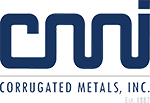FAQs
Our roll formed product and corrugated metal customers frequently ask similar questions concerning their needs for industrial roofing and siding products.
The following corrugated metal services, turnkey capability, and corrugated metal design FAQs cover many of the typical questions we are asked by buyers, contractors, original equipment manufacturers (OEMs), designers, builders, architects, specifiers, and other customers.
Corrugating FAQs
Answers to common questions about corrugating, corrugated metals products, materials we can corrugate, and our ancillary services.
Ordering FAQs
Answers to common questions about pricing, lead times, and ordering from Corrugated Metals, Inc.
Roll Forming FAQs
Answers to common questions about roll forming, materials/metals we can roll form, uses, and benefits.
No, we currently do not have a price list. CMI will gladly send you our brochure showing all our roll formed profiles, but since every project is so unique, we quote on a per project basis.
Our quotes contain very accurate lead-time estimates. If we don’t have your steel, aluminum, or COR-TEN® in stock, we contact our metal suppliers prior to quote response to ensure our quotes are as accurate as possible. Customer projects often must be coordinated with other construction activities and poor estimates can cause major headaches for our customers.
The best way to get the material ordered correctly to produce your profile would be to place a purchase order that contains the following information:
- Profile desired
- Gauge of material
- Paint or surface finish required
- Part length needed
- Width of the part needed
- Desired delivery date
Please call a CMI representative at 1-800-621-5617 to set up your profile.
Alclad is a composite sheet produced by bonding either corrosion-resistant aluminum alloy, often 7072, or aluminum of high purity to base metal, usually 3004 aluminum, of structurally stronger aluminum alloy. The coatings protect exposed areas of the core electrolytically during exposure to corrosive environment.
COR-TEN® is a high-strength, low-alloy steel produced by United States Steel. Besides its strength, the other main advantage of using COR-TEN® is its resistance to atmospheric corrosion. COR-TEN® develops its corrosion-resistant coating quickly, which also provides a characteristic color desired by many architects. COR-TEN® is frequently roll-formed by Corrugated Metals.
Stucco embossing applies a pebble-like finish etched into the formed metal. This process helps to reduce the amount of light reflecting off the metal, adds strength to the material, and makes the product more esthetically pleasing.
Yes, we can, depending on your definition of “wide”. We are unique among providers of metal corrugating services in that we can roll strip as narrow as 18″ and as wide as 63″. We specialize in corrugating metal with a gauge as thin as 0.017″ up to 0.250″.
Yes. We have the capability to corrugate pre-finished metals including painted, coated, and plasticized metals.
We offer a wide variety of corrugated metal profiles including:
Roll forming offers many benefits including its strict consistent adherence to close tolerances. This allows Corrugated Metals, Inc. to provide the shapes or profile you need consistently each order.
It is possible to eliminate many typical secondary operations by using the roll forming process reducing end-user costs. It is especially well suited to long continuous run projects. The cut to length option roll forming offers helps reduce scrap costs and material storage needs.
However, the major advantage of roll forming is the increase in strength to weight ratio over plain sheet metal. This strength allows some shapes to be produced with thinner walls than competing processes, reducing material costs.
Our products are used primarily in industrial roofing and siding applications plus panels for the transportation industry. Applications for our products include industrial and commercial buildings, agricultural storage facilities, chemical plants, manufacturing plants, airplane hangars, steel mills, food processing plants, and many others.
We have expertise in handling most common metals your corrugated project requires. We typically work with steel, aluminum, hot-dipped galvanized G-90 through G-285, cold–rolled CQ (Commercial Quality), hot-rolled P&O (pickled and oiled) COR-TEN®, stainless steel, aluminized types 1 & 2, pre-painted sheet metal, and galvannealed.
Roll forming is a process that takes metal sheet, usually coils, and passes it through a series of roller dies that progressively form the metal into the required profile or shape. The roll forming process can save end-users money since some operations, typically considered as secondary, can be combined in the roll forming operation.

